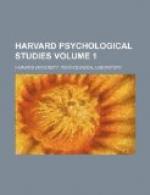These conditions, however, are for the most part but conditions which determine the energy, diversity, complexity and definiteness of the active processes involved in the bestowal of attention upon its object, and the experiments show that such active processes are as essential in ideation as in perception. The stability of an image, or internal sensation, thus depends on the activity of its motor accompaniments or conditions. And as the presence of an image to the exclusion of a rival, which but for the effect of these motor advantages would have as strong a claim as itself to the occupation of consciousness (cf. Series I., X.), may be treated as a case of inhibition, the greater the relative persistence of an image or idea the greater we may say is the ‘force’ with which it inhibits its rival. Exclusive possession of the field involves, to the extent to which such possession is made good, actual exclusion of the rival; and exclusion is inhibition. Our generalization, accordingly, may take the following form:—
The inhibitory effect of an idea, apart from volitional or emotional bias, depends upon the energy, diversity, complexity and definiteness of the motor conditions of the idea.
* * * * *
CONTROL OF THE MEMORY IMAGE.
BY CHARLES S. MOORE.
Since Gallon’s classic investigation in the field of mental imagery several similar investigations have been pursued in the same direction, chiefly, however, for the purpose of discovering and classifying types of imagination.
Little has been done in the line of developing and studying the problems of the memory image proper, and still less, in fact almost nothing, is to be found bearing on the control of the visual memory image. The general fact of this control has been presented, with greater or less detail, based upon returns from questionaries. Gallon himself, for example, having referred to instances in which the control was lacking, goes on to say[1]: “Others have complete mastery over their mental images. They can call up the figure of a friend and make it sit on a chair or stand up at will; they can make it turn round and attitudinize in any way, as by mounting it on a bicycle or compelling it to perform gymnastic feats on a trapeze. They are able to build up elaborate structures bit by bit in their mind’s eye and add, substract or alter at will and at leisure.”
[1] Gallon, Francis: ’Inquiries
into Human Faculty and its
Development,’ London, 1883,
p. 109.
More recent writers classify the students, or other persons examined, according to these persons’ own statements with regard to the nature and degree of control over the mental images which they consider themselves to possess. An article by Bentley[2] is the only study of a specific problem of the memory image. After a glance at the literature with reference to methods pursued in the investigation of problems of memory in general, Bentley outlines ‘a static and genetic account’ of the memory image in particular, and presents details of experiments ’carried on for the special investigation of the visual memory image and its fidelity to an original presentation.’




